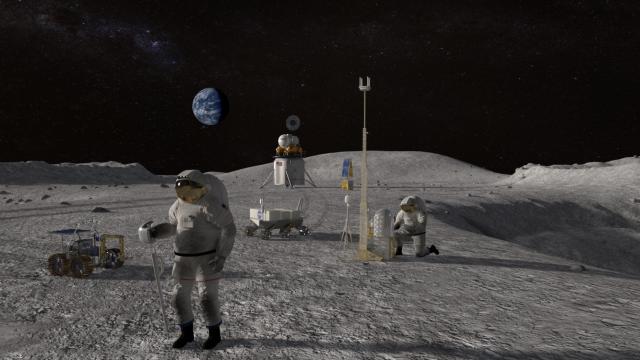A super-discouraging moment happened last week on Jeopardy!, when none of the show’s three contestants could answer a very basic question about NASA’s multi-billion dollar Moon program.
The question, as asked by Jeopardy! host Ken Jennings on the May 4 broadcast, fell into the “Keepin’ Up With NASA” category, and it read as follows: “The NASA program named for this sister of Apollo looks to land a woman (& a man) on the Moon by 2024.” The question was of apparent difficulty, as the answer carried the maximum $US1,000 ($1,388) value for the category.
And indeed, it turned out to be a triple stumper, as none of the three contestants were able to invoke the correct response: “What is Artemis?” Not even Mattea Roach, a Toronto-based tutor who came into the match having won 21 consecutive games and amassing a total of $US506,585 ($703,241) in winnings, was able to summon the answer. So “Artemis,” as a program, project, brand, or however one wishes to refer to it, doesn’t seem to be resonating with the larger public. Or at least, that’s how I’m reading this regrettable Jeopardy! moment.
In the “Keepin’ Up With NASA” category on @Jeopardy the other night no one said “What is #Artemis” (sigh) @NASA still has a lot of work to do on telling people about this multi-billion dollar back to the Moon thing Marc Etkind @pinballme Just sayin’ #NationalSpaceDay pic.twitter.com/iGiSznPNQj
— NASA Watch (@NASAWatch) May 6, 2022
This had to be disheartening for NASA, as well as a sign that it’s not doing enough to promote the Artemis program. But there are other factors to consider. Former President Donald Trump and Vice President Mike Pence announced Artemis in 2017, and though it was in the works before that administration, the association may have tainted the program in some Americans’ minds. Ongoing crises like the pandemic, the invasion of Ukraine, inflation, and the not-so-peaceful transition of power in January 2021 may also have made it hard for Artemis to capture the public’s imagination the way that Apollo did.
“I grew up in the 1960s during the Apollo era… but, given the constant reminders I got in school and in the news about going to the Moon, I knew exactly what the brother of Artemis was up to,” Keith Cowing, a former NASA employee and editor of the site NASA Watch, told me in an email. “So did everyone else.”
No doubt, Artemis can’t possibly compete with the Apollo program in terms of novelty, excitement, and historical significance. NASA is also having to justify these upcoming missions to an increasingly cynical public, who can justifiably question the need to go back to the Moon or ask how they themselves might benefit from the multi-billion-dollar program. NASA is seeking to make the mission more relatable by having a woman and a person of colour take part in Artemis 3, the first lunar landing since 1975, but it’s not clear if the message is getting through or the degree to which this matters to people.
That the Jeopardy! contestants couldn’t name Artemis is also problematic due to the amount of money that’s involved. According to a recent Inspector General audit, a total of $US40 ($56) billion has already been spent on the Artemis program, with another $US93 ($129) billion projected from now through to 2025. Alarmingly, NASA Inspector General Paul Martin estimates that each launch of NASA’s upcoming Space Launch System rocket will cost $US4.1 ($6) billion, a cost he described as “unsustainable” during a March meeting of the House Subcommittee on Space and Aeronautics.
Ongoing delays are another problem, and another potential reason why the public remains distanced from the program. Artemis has acquired a certain, “I’ll believe it when I see it” quality — a wholly understandable attitude, given that SLS has yet to launch and that recent tests of the 98.15 m-tall (98-metre) rocket have not gone smoothly. NASA’s current plan is to launch the rocket for the inaugural Artemis 1 mission in August, but further delays would not be surprising.
And that’s just the rocket. While the Orion crew capsule is ready for launch, other key elements have yet to be developed, such as the two requested lunar landers (both being developed privately) and the xEMU Moon suit. The current plan is to launch Artemis 3 in 2025 (Jeopardy! got it wrong, as 2024 is no longer a target), but 2026 is probably more likely.
I suspect that Artemis, as a name and a mission concept, will eventually enter into the common vernacular once the program hits some truly impressive milestones — and I’m not talking about the first launch of SLS. It’ll be Artemis 2, when a crewed Orion capsule will travel to the Moon and back without landing, that will capture wide public attention (this mission won’t launch until 2024 at the earliest). Until then, Artemis will continue to seem in the distant future, and nothing to get too excited about.
